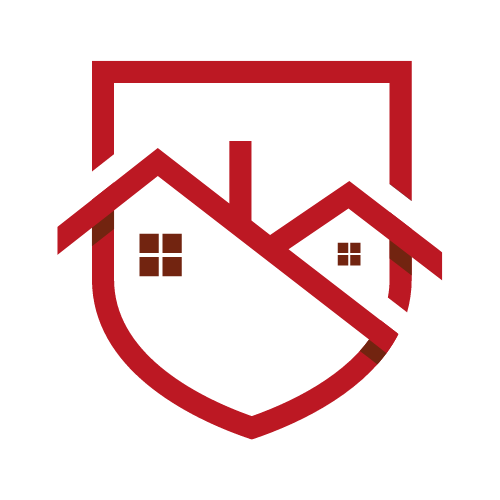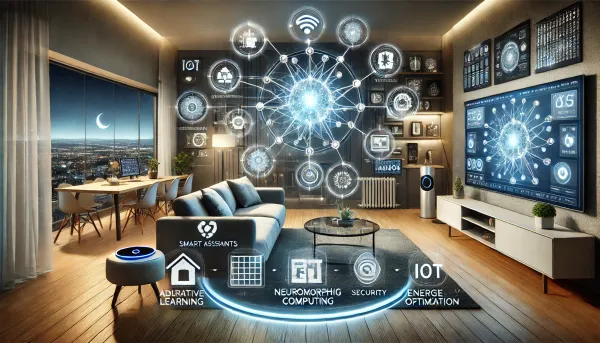The Role of Smart Homes in Abu Dhabi's AI-Native Smart City Vision

As Abu Dhabi advances toward becoming the world’s first fully AI-native city by 2027, smart homes are set to play a pivotal role in this transformation. These homes, equipped with cutting-edge technologies, will serve as the building blocks of a hyper-connected urban ecosystem where artificial intelligence (AI), the Internet of Things (IoT), and sustainability converge to redefine modern living. Here’s an in-depth look at how smart homes integrate into Abu Dhabi’s vision and their broader implications for the future of urban living.

Smart Homes: The Foundation of Smart Cities
Smart homes are no longer just about convenience or luxury; they are essential components of smart cities. By connecting individual households to city-wide networks, these homes enable seamless communication between residents and urban infrastructure. In Abu Dhabi, smart homes will act as microcosms of the larger AI-driven ecosystem, contributing to sustainability, efficiency, and improved quality of life.
Key Features of Smart Homes in Abu Dhabi
- Energy Optimization:
- Smart homes will use AI-powered systems to monitor and adjust energy consumption based on real-time data and user behavior. For instance, smart thermostats and lighting systems will adapt to residents' schedules, reducing waste and lowering costs[2][4].
- Integration with renewable energy sources like solar panels will allow homes to generate and store their own energy, contributing to a self-sustaining grid[4].
- Enhanced Security:
- AI-enabled surveillance systems will provide real-time monitoring and threat detection. These systems can communicate with city-wide networks to alert authorities during emergencies, enhancing public safety[2][6].
- Water Management:
- Smart irrigation systems and leak-detection sensors will optimize water usage, reducing waste and ensuring sustainable resource management[3][6].
- Health Monitoring:
- Integrated health systems within smart homes will allow for remote patient monitoring, enabling quicker medical responses and reducing the strain on healthcare facilities[3].
- AI-Powered Personalization:
- Homes will learn from residents’ preferences to create personalized environments, from adjusting room temperatures to recommending energy-saving practices[4][8].
Integration with Abu Dhabi's Smart City Infrastructure
Abu Dhabi’s smart city initiative envisions a fully interconnected urban environment where data flows seamlessly between homes, businesses, and public infrastructure. Here’s how smart homes fit into this larger framework:
- IoT Connectivity:
- Every device within a smart home—appliances, lighting systems, security cameras—will be connected through IoT networks. This connectivity allows for real-time data sharing with city infrastructure to optimize resource allocation and emergency responses[1][9].
- Predictive AI for Urban Services:
- Predictive AI systems embedded in smart homes can forecast energy demand or detect maintenance issues before they escalate. This data will feed into city-wide AI platforms to enhance service delivery across sectors like transportation and utilities[2][7].
- Sustainability Goals:
- By integrating with Abu Dhabi’s renewable energy initiatives, such as solar farms and green grids, smart homes will contribute significantly to the city’s goal of reducing its carbon footprint[4][5].
- Data-Driven Urban Planning:
- Data collected from smart homes—on energy use, water consumption, or waste generation—will inform urban planning decisions, enabling more efficient infrastructure development[6][9].
Challenges and Ethical Considerations
While the benefits of smart homes are immense, their integration into a fully AI-native city like Abu Dhabi raises several challenges:
- Data Privacy:
- With vast amounts of data being collected from smart homes, ensuring residents' privacy is paramount. Robust cybersecurity measures must be implemented to prevent misuse or breaches[2][8].
- Accessibility:
- Ensuring that smart home technologies are affordable and accessible to all residents is critical to avoid exacerbating social inequalities within the city[2].
- Energy Equity:
- While renewable energy integration is a key feature of smart homes, equitable access to these technologies must be prioritized so all residents can benefit from reduced costs and environmental impact[4].
Global Comparisons: How Abu Dhabi Stands Out
Abu Dhabi’s approach differs significantly from other global initiatives in its scale and ambition:
- Singapore: While Singapore focuses on integrating AI into urban planning incrementally through its Smart Nation initiative, Abu Dhabi aims for full automation across all government processes by 2027.
- Amsterdam: Amsterdam emphasizes sustainability through decentralized renewable energy solutions but lacks the comprehensive AI-native integration seen in Abu Dhabi.
- Tokyo: Tokyo incorporates IoT in its infrastructure but has not yet achieved the level of interconnectedness between private residences and public systems envisioned by Abu Dhabi.
Abu Dhabi’s strategy is unique in its emphasis on creating a unified ecosystem where every home contributes actively to the city’s overall efficiency and sustainability.
The Future of Living: A Day in an Abu Dhabi Smart Home
Imagine waking up in an Abu Dhabi smart home in 2027:
- Your AI assistant adjusts your blinds based on sunrise times while optimizing indoor temperatures for comfort.
- As you prepare breakfast, your refrigerator suggests recipes based on expiring ingredients to minimize food waste.
- On your way out, your home automatically powers down non-essential devices while syncing with the city grid to conserve energy.
- During the day, your home monitors water usage patterns and sends recommendations for more sustainable practices.
- In case of an emergency—such as a fire or medical issue—your home communicates directly with emergency services for immediate assistance.
This vision encapsulates how smart homes will transform daily life within Abu Dhabi’s AI-native city.
What are the main challenges in integrating smart homes into smart cities
Challenges in Integrating Smart Homes into Smart Cities
Smart homes are integral to the vision of smart cities, offering enhanced efficiency, sustainability, and quality of life. However, their integration into smart city ecosystems presents several significant challenges that must be addressed to ensure seamless adoption and operation. Below is an in-depth exploration of these challenges, categorized into key areas such as technology, accessibility, security, and infrastructure.
1. High Costs of Technology
The financial barrier is one of the most significant obstacles to integrating smart homes into smart cities. Smart home technologies often come with high upfront costs for devices, installation, and maintenance. For many residents, especially in developing economies, these expenses are prohibitive.
- Cost of Ownership: The purchase and installation costs of smart home devices are substantial, and ongoing operational expenses can further deter adoption[1][2].
- Obsolescence: Rapid advancements in technology mean that devices can become outdated quickly, raising concerns about long-term value for homeowners[7].
Proposed Solutions:
- Subsidies or incentives from governments to reduce costs for residents.
- Development of modular systems that allow incremental upgrades rather than full replacements[1].
2. Fragmentation and Interoperability Issues
Smart home devices often come from various manufacturers with differing operating systems and communication protocols. This lack of standardization creates fragmentation, making it difficult for devices to interact seamlessly within a home or across a city-wide network.
- Device Incompatibility: Many smart devices cannot communicate effectively with others due to proprietary protocols[7].
- Manageability: Poor interoperability limits the ability to integrate homes into broader smart city systems, such as energy grids or public safety networks[1].
Proposed Solutions:
- Establishing universal standards for IoT communication protocols.
- Encouraging manufacturers to adopt open-source platforms for better interoperability[7].
3. Data Privacy and Security Concerns
The integration of smart homes into smart cities raises serious concerns about data privacy and cybersecurity. Smart homes generate vast amounts of sensitive data related to residents’ behaviors and preferences.
- Cybersecurity Risks: Vulnerabilities in IoT devices can expose homes to hacking or unauthorized access[3][7].
- Ethical Data Use: Ensuring that data collected by smart homes is used responsibly by governments and corporations is critical[4].
Proposed Solutions:
- Implementing robust encryption standards for all data transmissions.
- Developing clear policies on data collection, storage, and usage to protect residents' privacy[4].
4. Accessibility and Socioeconomic Inequality
Smart home technologies risk exacerbating existing inequalities if they remain accessible only to wealthier populations. This challenge is particularly relevant in large-scale smart city initiatives like Abu Dhabi’s AI-native strategy.
- Economic Divide: High costs may limit access to smart homes for lower-income households[4].
- Digital Literacy: Lack of awareness or technical knowledge among certain demographics could hinder adoption[7].
Proposed Solutions:
- Offering affordable versions of smart home technologies.
- Launching educational campaigns to improve digital literacy among residents[4][7].
5. Infrastructure Limitations
Integrating smart homes into smart cities requires robust infrastructure capable of supporting high-speed connectivity and reliable power supplies.
- Network Reliability: Fluctuating signals or insufficient bandwidth can disrupt the functionality of interconnected devices[1][3].
- Power Supply Issues: In regions with unreliable electricity grids, maintaining continuous operation of smart home systems becomes a challenge[1].
Proposed Solutions:
- Investing in advanced networking solutions like 5G or edge computing.
- Developing backup power systems such as solar panels or battery storage for uninterrupted operation[3].
6. Resistance to Adoption
Many residents remain skeptical about adopting smart home technologies due to concerns about automation’s impact on daily life or fears that it may make them overly dependent on technology.
- Behavioral Resistance: Some users feel that high levels of automation deprive them of meaningful experiences or control over their environment[1].
- Technology Anxiety: Fear of complexity or malfunction discourages adoption among less tech-savvy individuals[5].
Proposed Solutions:
- Designing user-friendly interfaces that simplify device management.
- Offering hybrid systems that allow manual control alongside automation for greater flexibility[5].
7. Legacy Systems Integration
In cities transitioning from older infrastructure to modern smart city frameworks, integrating legacy systems with new technologies poses a significant challenge.
- Compatibility Issues: Older systems often lack the capability to communicate with advanced IoT networks used by smart homes[6].
Proposed Solutions:
- Using middleware solutions or APIs to bridge gaps between legacy systems and modern technologies.
- Gradual phasing out of outdated infrastructure while ensuring minimal disruption during transitions[6].
Conclusion
While the integration of smart homes into smart cities offers immense potential for improving urban living, addressing these challenges is essential for widespread adoption. Governments, manufacturers, and policymakers must work collaboratively to overcome barriers related to cost, interoperability, security, accessibility, infrastructure limitations, behavioral resistance, and legacy system integration.
By implementing strategic solutions—such as subsidies, universal standards for IoT devices, robust cybersecurity measures, and educational campaigns—smart homes can become accessible and functional components within interconnected urban ecosystems like Abu Dhabi’s AI-native city vision. With careful planning and execution, these challenges can be mitigated to unlock the full potential of smart homes in shaping the cities of the future.
Conclusion
Smart homes are not just technological marvels; they are integral to realizing Abu Dhabi’s vision of becoming the world’s first fully AI-native city. By seamlessly integrating advanced technologies into daily living spaces, these homes will redefine convenience, sustainability, and security for residents.
As Abu Dhabi leads this transformation on a global stage, it sets a precedent for how cities can leverage AI and IoT technologies not only to improve urban living but also to create equitable and sustainable environments for future generations.
Citations:
[1] https://www.powerpartnermn.com/the-future-is-here-moving-towards-smart-homes-and-smart-cities/
[2] https://www.thesmartcityjournal.com/en/smart-building/how-smart-homes-will-be-integrated-into-smart-cities
[3] https://www.smarthomeiq.net/blog/smart-technology-urban-planning
[4] https://new.abb.com/news/detail/107249/smart-homes-make-green-cities-possible
[5] https://www.greencitytimes.com/sustainable-smart-home/
[6] https://www.truehomeprotection.com/the-environmental-benefits-of-using-smart-home-systems/
[7] https://www.automate.org/news/smart-cities-smart-homes-smart-cars-and-smart-watches-whats-next-in-the-digital-world-and-how-can-it-improve-human-quality-of-life
[8] https://www.urbanlaliving.com/smart-homes-the-future-of-urban-living
[9] https://www.rishabhsoft.com/blog/iot-in-smart-cities-applications-benefits
[10] https://www.linkedin.com/pulse/smart-homes-from-luxury-necessity-future-living-ansal-mt-dc0yc
[11] https://www.innovationnewsnetwork.com/how-smart-technology-is-helping-make-sustainable-living-a-reality/46488/
[12] https://blog.mipimworld.com/guide-green-real-estate/green-real-estate-role-smart-technology-urban-planning/
[13] https://www.smart-energy.com/industry-sectors/iot/the-role-of-smart-buildings-in-the-development-of-smart-cities/
[14] https://nutmegtech.com/blog-2/655-the-future-of-internet-of-things-from-smart-homes-to-smart-cities.html
[15] https://www.planetizen.com/news/2024/07/130328-12-technologies-will-shape-future-urban-planning
[16] https://etech.iec.ch/node/844
[17] https://iotbusinessnews.com/2023/11/10/89810-the-smart-home-revolution-how-iot-is-transforming-modern-living/
[18] https://www.mckinsey.com/capabilities/operations/our-insights/smart-cities-digital-solutions-for-a-more-livable-future
[19] https://blog.transactly.com/the-influence-of-smart-city-initiatives-on-real-estate
[20] https://www.forbes.com/councils/forbestechcouncil/2023/02/22/smart-cities-iot-the-rise-of-home-wellness-technology/
[21] https://earth.org/smart-city-technologies/
[22] https://www.dotmagazine.online/issues/how-smart-is-the-cloud/what-it-takes-to-make-a-port-city-smart/smart-city-smart-home-the-opportunities-and-benefits-for-companies
[23] https://cdss.berkeley.edu/exploration-challenges-and-potential-smart-home-technology-designs
[24] https://www.thalesgroup.com/en/markets/digital-identity-and-security/iot/inspired/smart-cities
[25] https://siliconvalley.center/blog/transforming-cities-with-iot-the-promise-of-smart-world
[26] https://www.cemexventures.com/what-is-a-smart-city-technology-and-examples/
[27] https://www.sandtech.com/insight/smart-cities-in-the-us/
[28] https://www.uc.edu/content/dam/refresh/cont-ed-62/olli/22-winter/future smart cities homes energy.pdf
[29] https://www.weforum.org/stories/2022/07/smart-cities-urban-areas-that-benefit-everyone/
[30] https://www.getambee.com/blogs/eco-friendly-future-smart-homes
[31] https://www.plantemoran.com/explore-our-thinking/insight/2018/04/thinking-about-becoming-a-smart-city-10-benefits-of-smart-cities
[32] https://www.samsung.com/us/business/builder/industry-innovation/insights/how-smart-home-technology-benefits-add-value-in-apartments/
[33] https://sustainabilitymag.com/articles/the-future-of-ai-and-iot-in-sustainable-smart-cities
[34] https://www.beonic.com/blog/smart-city-technology-benefits
[35] https://www.tomorrow.city/smart-homes-small-changes-with-a-big-impact-on-cities/
[36] https://lanars.com/blog/the-impact-of-ai-and-iot-on-urban-living
[37] https://online-engineering.case.edu/blog/building-smart-cities-and-infrastructure
[38] https://giganticplayground.com/smart-homes-to-smart-cities-the-convergence-of-ai-and-iot-in-shaping-tomorrow/
[39] https://www.eva-last.com/us/the-role-of-smart-cities-in-future-urban-planning/
[40] https://www.beesmart.city/en/strategy/why-smart-home-is-facilitating-smart-communities
[41] https://www.insightsip.com/markets/smart-home-smart-city
[42] https://www.techtarget.com/iotagenda/definition/smart-home-or-building
[43] https://www.vvdntech.com/en-us/blog/navigating-the-smart-city-domains-a-comprehensive-guide/
[44] https://tektelic.com/expertise/top-smart-cities-examples/
[45] https://www.pcmag.com/picks/the-best-smart-home-devices
Answer from Perplexity: pplx.ai/share






